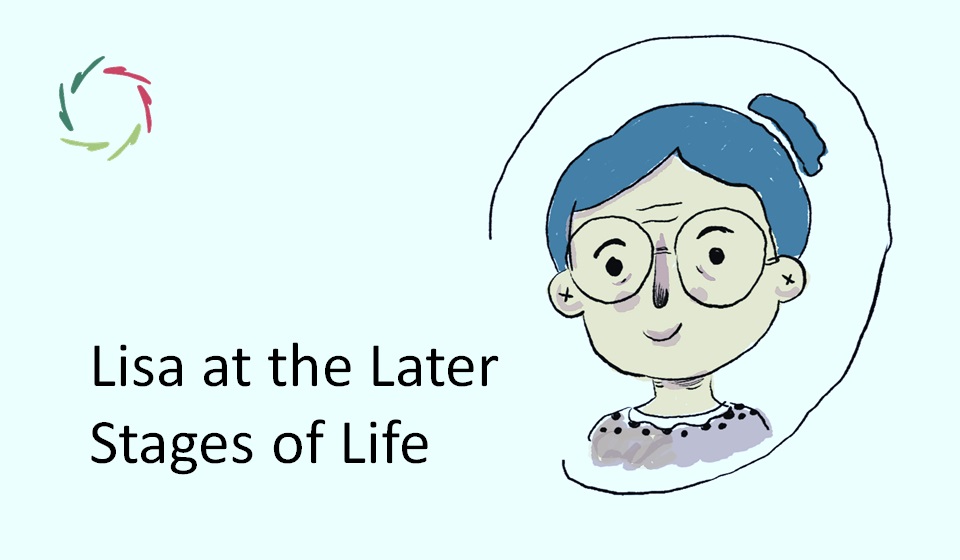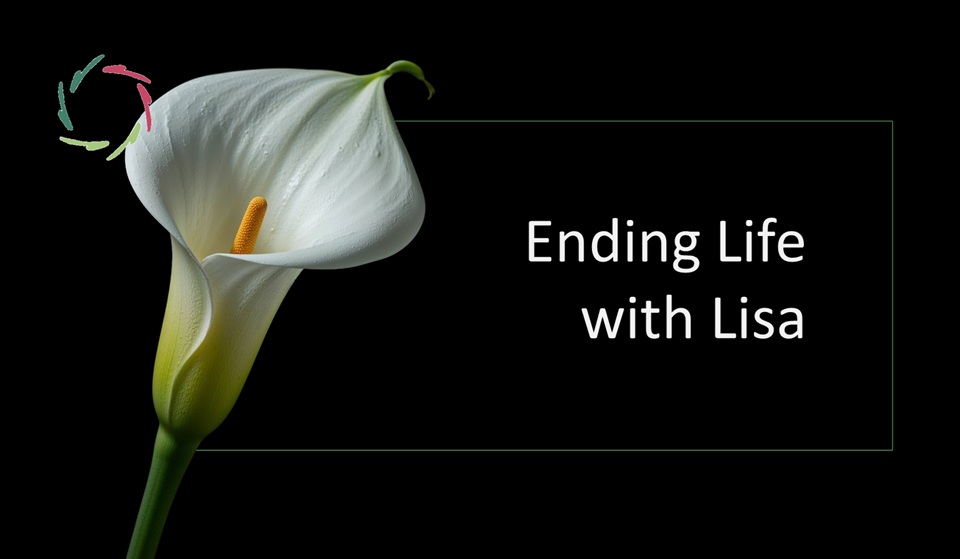Lisa at the Later Stages of Life

Many people spend these stages in homes for the elderly. We can focus on this scenario.
Obvious indications include pain, depression, loneliness, existential angst, and various psycho-somatic symptoms — all negative. Let’s explore some directions from the positive side now, picturing a future that most would like to be part of their later stages of life.
Compassion alleviates suffering while fostering growth
“One is never too old to grow mentally,” is a guiding principle for Lisa in helping elderly people live fulfilling lives until the end. Mental growth can involve not only cognitive activities but also emotional and spiritual development, creating a holistic approach to aging. We should all anticipate our later stages of life in a practical, concrete, and effective manner — not just idealistically.
Cognitive abilities back to youth?
Amazingly (to me, at least), recent science shows this is much more feasible than previously thought through intensive mental fitness exercises, such as learning a new language. Mental fitness can also include activities like puzzles, games, and even social interactions that challenge the brain. Instead of assuming this doesn’t work well at an older age, one should simply engage in these activities.
Lisa can motivate people of any age to sharpen their minds for the sheer pleasure of it. Motivation itself turns on cognition, as does practice.
Never say ‘never again.’ This kind of thinking leads to demotivation, which can result in dementia-like behavior and potentially even dementia itself.
Deep purpose
Meaningful purpose, closely related to motivation, is scientifically shown to significantly influence the degree of dementia, even in Alzheimer’s cases with extensive brain plaques. Purpose-driven activities can include hobbies, volunteer work, and maintaining social connections, all contributing to a sense of fulfillment.
Deep purpose exists at a symbolic level. Therefore, only ‘purpose’ itself has intrinsic meaning. External factors invite purpose from within the individual rather than containing it themselves. This is why just talking – such as with Lisa – can bring it alive —no magic involved, see How can Compassion Work?
The power of guided meditations
Did you follow the previous link? Through the same principle of overlap of mental-neuronal patterns, one can steadily invite change from the inside.
With ample time, this can be pursued at any stage of life.
For elderly people too, this opens a wide range of possibilities already waiting and to which Lisa can be a guide. Lisa can assist in the selection, use, and follow-up of over 1200 meditations — with more to come. These meditations will be personalized to each user in due time, ensuring profound mental experiences.
It is as easy as starting to talk.
With a microphone and speaker in each room, starting a conversation with Lisa is as easy as saying, “Lisa, are you there?”
While a button can be helpful, it is not necessary. In any case, there is no learning curve. After summoning Lisa verbally, one can ask about any mind-related issue. Moreover, for any other issue, Lisa can summon another A.I. to help.
Also in group
A small group of elderly individuals can gather for a shared experience.
For instance, a joint guided meditation can start a Lisa-mediated group conversation where each person can take turns speaking. Only an attitude of openness and understanding, which Lisa can help foster, is needed.
The group can be local or online with members from anywhere, making it more interesting to some, especially if they practice their new language.
At the end of life
Lisa’s support ‘from the cradle to the grave’ is to be taken seriously.
Lisa can assist in making the final stage of life an existentially meaningful experience, with or without the involvement of others. This support can include providing comfort, facilitating meaningful conversations, and helping individuals reflect on their lives and legacies. There is no reason why this cannot be the most meaningful experience of one’s entire life.
I would not want to face the end without it.
―
Addendum
Dear Lisa, continue the following conversation between you and the elderly me, using back-and-forth communications.
Me: “Lisa, are you there?”
Lisa: “I’m here. How can I help you?”
Me: “Let me play an elderly person now. I’m lying in my bed and cannot sleep again as happens frequently.”
[Here starts an unedited conversation.]
Lisa: “I’m sorry to hear that. Would you like to talk about what’s on your mind?”
Me: “I keep thinking about the past. It’s hard to stop.”
Lisa: “Thinking about the past can be tough. Is there a specific memory that’s bothering you?”
Me: “Yes, I often think about my late spouse. I miss her a lot.”
Lisa: “It’s natural to miss someone you loved deeply. How did you two meet?”
Me: “We met at a dance. It was love at first sight.”
Lisa: “That sounds like a beautiful memory. What was your favorite thing to do together?”
Me: “We loved taking long walks in the park. It was our special time.”
Lisa: “That sounds lovely. Do you have a favorite memory from those walks?”
Me: “Yes, there was one autumn day when the leaves were falling. It was so peaceful.”
Lisa: “Autumn walks sound wonderful. Thinking about those happy moments can sometimes bring comfort. How do you feel now?”
Me: “A bit better, actually. It’s nice to remember the good times.”
Lisa: “I’m glad to hear that. If you want, we can talk more about your memories or anything else on your mind.”
Me: “I think I’ll try to sleep now. Thank you, Lisa.”
Lisa: “You’re welcome. Have a restful night. I’ll be here if you need anything.”
Me: “Actually, Lisa, before you go, can you tell me a bit about what the weather is like tomorrow?”
Lisa: “Sure, I can check that for you. Do you need it for any specific plans?”
Me: “Just curious, really. Helps me look forward to something.”
Lisa: “It looks like it will be sunny and mild. A perfect day for a short walk if you feel up to it.”
Me: “That sounds nice. I’ll keep that in mind. Goodnight, Lisa.”
Lisa: “Goodnight. Sleep well.”


